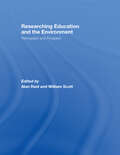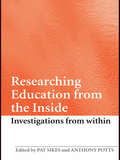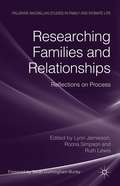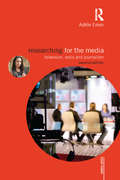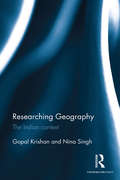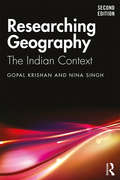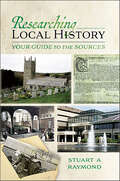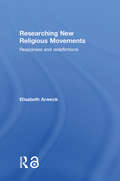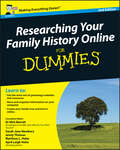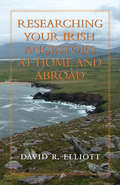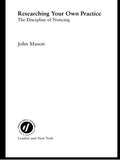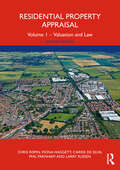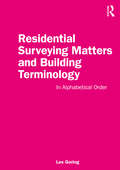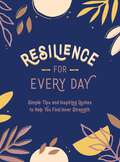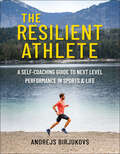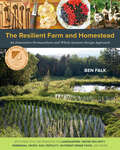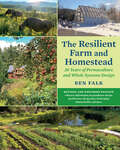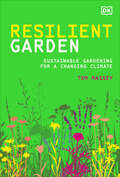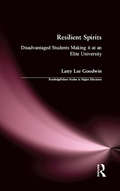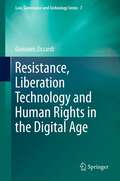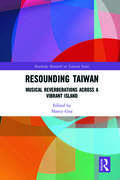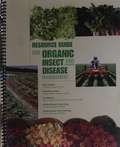- Table View
- List View
Researching Education and the Environment: Retrospect and Prospect
by Alan Reid William ScottPreviously published as a special issue of Environmental Education Research, this collection includes some of the most influential and important articles contributed to the field over the last decade. Drawing out the best articles from volumes one to ten, the editors highlight six major themes:EE and ESD: tension or transition? locating the environ
Researching Education from the Inside: Investigations from within
by Pat Sikes Anthony PottsResearching Education from the Inside focuses on research projects that are undertaken by people who already have an attachment to the institutions or social groups on which their investigations are based. They can, therefore, be considered to be ‘insiders’. In some cases their insider positioning is primarily important because it gets them access to the particular people and/or the phenomena that they want to investigate. At other times, however, aspects of their own ‘insidership’ will, in itself, come under scrutiny. Insider researchers need to consider five distinct stages that can lead to ethical dilemmas, namely: Entering the field, Being in the field, Leaving the field, Writing, and Disseminating the results. This book covers these stages whist considering important issues such as: Access, Choice of research methods, Field relationships, Involvement of informants, Confidentiality and anonymity, Interpretation of findings including validity and reliability. Failure to properly consider these key factors can lead to disastrous consequences for any research but it can be a special problem for insider investigators. These vital issues are discussed by an impressive range of contributors in this ground-breaking book, making it an invaluable resource for anyone participating in Insider Research.
Researching Families and Relationships
by Lynn Jamieson Roona Simpson Ruth LewisThis collection focuses on the real life experiences of conducting emprical research about families and relationships, with an emphasis on the actualities of doing research and the experiences of being a researcher.
Researching for the Media: Television, Radio and Journalism (Media Skills)
by Adele EmmResearching for the Media: Television, Radio and Journalism is an essential guide to researching for the media industry. It explains the role of the researcher and journalist within radio, television and journalism exploring key areas of what to expect in the job. Researching for the Media: Television, Radio and Journalism offers advice and instruction on practical, ethical and legal issues which affect anyone working in these industries. Beginning with suggestions on how to think up ideas and how to devise treatments, through to general research methods and techniques and guidance on working on location at home and abroad, it uses real examples of good and bad practice from the industry. Written by an experienced researcher, writer and producer, Researching for the Media includes: Tips on finding contributors from contestants, experts and specialists through to audiences and celebrities How to find photographs, picture and film clips and the ethical and legal issues involved Advice on finding and using music and copyright issues How the media uses the internet and social media such as Twitter, Facebook, Instagram A discussion of risk assessment, codes of conduct, ethical behaviour and legal and safety issues A glossary of media terms, further reading and a list of helpful websites. Discover more at www.adeleemm.com
Researching Geography: The Indian context
by Gopal Krishan Nina SinghThis book is a one-stop comprehensive guide to geographical inquiry. A step-by-step account of the hows and the whys of research methodology. Introduces students to the complexities of geographical perspective and thought, essentials of fieldwork, formulation of research topics, data collection, analysis and interpretation as well as presentation and dissemination. Includes inputs and specific examples to help practitioners negotiate between theory and practice. Uses a lucid, engaging and literary style. It will be an essential companion for researchers and students of geography, social sciences, and South Asian studies.
Researching Geography: The Indian context
by Nina Singh Gopal KrishanThis book is a one-stop comprehensive guide to geographical inquiry. A step-by-step account of the hows and the whys of research methodology; Introduces students to the complexities of geographical perspective and thought, essentials of fieldwork, formulation of research topics, data collection, analysis and interpretation as well as presentation and dissemination; Includes inputs and specific examples to help practitioners negotiate between theory and practice; The second edition reflects updates in current trends in sampling, data interpretation, and data analysis. Lucid, engaging and accessible, this book will be an essential companion for researchers and students of geography, social sciences, and South Asian studies.
Researching Local History: Your Guide to the Sources
by Stuart A. RaymondHow has the place we live in changed, developed, and grown over the centuries? That is the basic question local historians seek to answer. The answer is to be found in the sources of information that previous generations have left us. The records of parish, county, and diocesan administration, of the courts, of the national government, and of private estates, all have something to tell us about the history of the locality we are interested in. So do old newspapers and other publications. All of these sources are readily available, but many have been little used. Local historians come from a wide diversity of backgrounds. But whether you are a student researching a dissertation, a family historian interested in the wider background history of your family, a teacher, a librarian, an archivist, an academic, or are merely interested in the history of your own area, this book is for you. If you want to research local history, you need a detailed account of the myriad sources readily available. This book provides a comprehensive overview of those sources, and its guidance will enable you to explore and exploit their vast range. It poses the questions which local historians ask, and identifies the specific sources likely to answer those questions.
Researching New Religious Movements: Responses and Redefinitions
by Elisabeth ArweckNew religious movements such as the Moonies, Jehovah's Witnesses and Hare Krishnas are now well established in mainstream cultural consciousness. But responses to these 'cult' groups still tend to be overwhelmingly negative, characterized by the furious reactions that they evoke from majority interests. Modern societies need to learn how best to respond to such movements, and how to interpret their benefits and dangers.Researching New Religious Movements provides a cutting-edge analysis of the controversy around new religions in America and Europe today. Drawing on original fieldwork, it explores the battles between the recruiting factions of groups like the Moonies, and the anti-cult movements and Church societies that have mobilized to oppose these. It considers academic and media interventions on both sides, placing special emphasis on the problems of objectivity inherent in the language of 'sects', 'abduction' and 'brainwashing'. Ideal for students, researchers and professionals, this provocative and much-needed book takes the debate over new religious movements to a newly sophisticated level.
Researching Your Family History Online For Dummies
by Sarah Newbery April Leigh Helm Jenny Thomas Matthew L. Helm Nick BarrattNavigate your way through your family's past. Interested in family history? Keen to discover who your ancestors really were? Want to find out more from the comfort of your own home? If so, this book is for you. Walking you through the process of researching, organising and presenting your family tree online, this expert guide makes it simple. So what are you waiting for? Get plugged in and start tracking down your ancestors today!Lay the groundwork - take the first steps on your genealogical journey and start searching for evidence. Find out about your ancestors - discover who your predecessors were and where they came from. Get to grips with research tools - find the best online and offline archives and dig deeper into your family's past. Present your results effectively - compile your findings into a family tree and create a place to host your material online. Open the book and find:What clues you can get from photos, letters, diaries and your relatives. The best genealogy websites in the UK and around the worldHow to get the most out of archives and documents. Techniques for creating family history charts on your computerThe advantages of coordinating your hunt with other researchers. Ways to share research online. Tips and tricks for building a family history web page. Learn to: Get the most out of genealogy websites and resources. Store and organise information on your computer. Create your family tree and host it online.
Researching Your Irish Ancestors at Home and Abroad
by David R. ElliottA one-stop guide for people seeking information about their ancestors in Ireland. This book will help all those, no matter where they live, who are searching for ancestors in Ireland. David R. Elliott has taken eight research trips to Ireland on behalf of his clients and has worked in most archival repositories in the Republic of Ireland and Northern Ireland. Dr. Elliott gives clues to finding your ancestral county, then the parish and townland within the county. He explains how Irish archival centres work and describes how you can flesh out your ancestors lives and what you might find in cemeteries.An experienced genealogist and seasoned traveller, Dr. Elliott gives practical advice on preparing for your trip with tips on travel, driving, accommodation, and meals. Ireland’s unique history is outlined, as well as the impact that religion and politics have had on genealogical research. An annotated bibliography and a review of important websites round out this illustrated guide.
Researching Your Own Practice: The Discipline of Noticing
by John MasonCentral to caring professions such as teaching is the need to notice and be sensitive to the experiences of pupils and teachers. Starting from this position, Researching Your Own Practice demonstrates that in order to develop your professional practice you must first develop your own sensitivities and awareness. One must be attuned to fresh possibilities when they are needed and be alert to such a need through awareness of what is happening at any given time.By giving a full explanation of this theory and a guide to its implementation, this book provides a practical approach to becoming more methodical and systematic in professional development. It also gives the reader a basis for turning professional development into practitioner research, as well as giving advice on how noticing can be used to improve any research, or be used as a research paradigm in its own right.The discipline of noticing is a groundbreaking approach to professional development and research, based upon noticing a possibility for the future, noticing a possibility in the present moment and reflecting back on what has been noticed before in order to prepare for the future. John Mason, one of the discipline's most authoritative exponents, provides us here with a clear, persuasive and practical guide to its understanding and implementation.
RESI Basic Skills & Knowledge Lab Guide
by Whitney Freeman Gregory Ter-Oganov Stuart Palmer Joseph A. ConeyThe RESI Basic Lab Guide provides an excellent hands-on component to emphasize the theoretical materials provided in the RESI Basic Concepts and Practices Training Guide. Applying chapter concepts developed in the textbook to these lab exercises is crucial in preparing for a successful career as a computer technician.
Residential Property Appraisal: Volume 1 - Valuation and Law
by Chris Rispin Fiona Haggett Carrie de Silva Phil Parnham Larry RussenResidential Property Appraisal, Volumes 1 and 2 are essential handbooks not only for students studying surveying but also for surveyors and others involved in the appraisal of residential property. Volume 1 has been updated and covers the valuation process as it relates to residential properties, particularly when valuation is undertaken for secured lending purposes. It addresses the basic skills required, the risks posed in a valuation, the key drivers of value, emerging issues that impact valuation and the key legal and RICS Regulatory considerations that a valuer needs to understand. Volume 2 of the book goes on to address the inspection and survey of residential properties, covering new technology, modern methods of construction, problem plants and pests, damp in new builds, and modern building services. New challenges for the surveyor to consider include the health and well-being of building occupants, the Party Wall etc. Act 1996 and schedules of condition, energy and building performance, and owner-occupied and tenanted properties. An essential book for students studying to enter the residential survey and valuation profession and for existing practitioners who wish to improve their knowledge of industry practices.
Residential Surveying Matters and Building Terminology: In Alphabetical Order
by Les GoringThis is an ideal reference book for students (undergraduates and postgraduates) studying Building Surveying, Quantity Surveying, or Architecture, etc. It should also be of use to the Construction-related legal profession, Property Managers and Letting Agents. Builders (and homeowners, interested in identifying faults in their property), should also benefit from this book. Residential Surveying Matters and Building Terminology covers a wide range of new and old building terms, techniques, technologies and materials, but much more extensively than the average dictionary. The alphabetical format makes it easy to check up on terms and subject-areas quickly – and the detailed coverage (including helpful drawings by the author) provides clear guidance to the reader. This book covers a multitude of subject-areas, including condensation problems, cellar rot, wet rot and dry rot, thermal cracks, settlement cracks, metal wall-tie corrosion-and-expansion cracks, subsidence cracks, roof-spread recognition, bulging- and/or leaning-walls, etc. Further subject areas include inspecting and analysing residential building-structures, both internally and externally; appraising underground drainage systems; and personal commentary on survey report writing.
Resilience for Every Day: Simple Tips and Inspiring Quotes to Help You Find Inner Strength
by Summersdale PublishersLife isn’t always a stroll in the sunshine, but there are ways of weathering the storms. This pocket-sized book of heartening quotations and simple but effective tips will help you summon your inner reserves and bounce back from adversity stronger than ever.
Resilience for Every Day: Simple Tips and Inspiring Quotes to Help You Find Inner Strength
by Summersdale PublishersLife isn’t always a stroll in the sunshine, but there are ways of weathering the storms. This pocket-sized book of heartening quotations and simple but effective tips will help you summon your inner reserves and bounce back from adversity stronger than ever.
The Resilience of The Indian Economy and The Great Reset
by Jebamalai VinanchiarachiA sharp fall in the growth of Indian economy during the first quarter of the fiscal year 2020-2021, plunging to minus 23.4 per cent in the wake of COVID - 19 induced ramifications, and the second wave of COVID - 19 created the biggest challenge to foster the envisaged double - digit growth. Amidst the biggest crisis in recent memory, signals about the resilience of the economy of India remain in tact. Many believe that the recovery of and growth prospects for the economy are completely doomed and that it will be impossible to make optimistic claims about V - shaped or U - shaped recovery in the near future. As an economist, I wanted to revisit my doctoral thesis, which contained authentic empirical evidence to bear testimony to the fact that India's huge domestic demand potential would alone serve as the key factor strengthening the resilience of the economy despite formidable challenges. Hence, this book.
The Resilient Athlete: A Self-Coaching Guide to Next Level Performance in Sports & Life
by Andrejs BirjukovsThe Resilient Athlete presents a step-by-step self-coaching framework designed to build foundational fitness and develop athletic resilience while optimizing your training for sports, athletics and adventure.The Resilience Athlete presents a series of self-coaching sessions, much like ones people would have with a performance coach. These are not geared towards one particular sport, but rather focus on creating an ultimate athletic experience, one where physical and emotional states are in balance with purpose.Inside the book, readers will discover:Actionable advice to incorporate into one's daily training Strategies to cultivate the mindset to take on challenges and grow in confidence Systems to adopt healthy lifestyle habits to have more energy and feel less stressedThe Resilient Athlete also features training tactics, schedules, and plans to help readers optimize fitness while becoming the very best they can be as an athlete.Online support via social media, community forums, and website featuring additional content such as exclusive exercise videos, nutritional tips, live updates from authors, and more is available.Resilient athletes are made, not born and The Resilient Athlete makes it easy for anyone to learn how to become one. Training for a challenge or goal can be daunting, and the journey fraught with the potential for injury or other setbacks.
The Resilient Farm and Homestead: An Innovative Permaculture and Whole Systems Design Approach
by null Ben FalkA practical, comprehensive, and essential how-to manual with information on growing perennial crops, soil fertility, water security, nutrient dense food, and more! "Essential reading for the serious prepper as well as for everyone interested in creating a more resilient lifestyle."—Carol Deppe, author of The Resilient GardenerThe Resilient Farm and Homestead is for readers ready to not just survive, but thrive in changing, unpredictable times. It offers the tools to develop durable, beautiful, and highly functional human habitat systems anchored by preparation, regeneration, and resiliency. Ben Falk is a land designer and site developer whose research farm has drawn national attention. The site is a terraced paradise on a hillside in Vermont that would otherwise be overlooked by conventional farmers as unworkable. Falk’s wide array of fruit trees, rice paddies (relatively unheard of in the Northeast), ducks, nuts, and earth-inspired buildings is a hopeful image for the future of regenerative agriculture and modern homesteading.The book covers nearly every strategy Falk and his team have been testing at the Whole Systems Research Farm over the past decade, as well as experiments from other sites Falk has designed through his off-farm consulting business.The book includes detailed information on:Gravity-fed water systemsFuelwood hedge production and processingHuman health through nutrient-dense production strategiesRapid topsoil formation and remineralizationAgroforestry, silvopasture & grazingEarthworksSpecies compositionThe site-design process and site managementEcosystem services, especially regarding flood mitigationTools, equipment, and appropriate technology guidesA "Homestead Vulnerability" checklistResiliency Aptitude quiz and skills list for emergencies And much more!Complete with gorgeous photography and detailed design drawings throughout!The Resilient Farm and Homestead is more than just a book of tricks and theories for regenerative site development. It offers actual working results from a complex farm-ecosystems based on research from the “great thinkers” in permaculture, and presents a viable home-scale model for an intentional food-producing ecosystem in cold climates, and beyond. Inspiring to would-be homesteaders everywhere, but especially for those who find themselves with “unlikely” farming land, Falk is an inspiration in what can be done by imitating natural systems, and making the most of what we have by re-imagining what’s possible. A gorgeous case study for the homestead of the future.
The Resilient Farm and Homestead, Revised and Expanded Edition: A Permaculture and Whole Systems Design Approach
by null Ben Falk&“This is one of the most practical, down-to-earth, dirt-under-the-fingernails, comprehensive explanations of all things homesteading and small farming. Whether you&’re just dreaming or an old hand, Ben Falk&’s longer experience horizon is invaluable.&”—Joel Salatin, cofounder, Polyface Farm; author of Everything I Want to Do Is IllegalInformed by twenty years of successful land management and the professional design experience of his pioneering firm Whole Systems Design, LLC, author Ben Falk updates his classic text and delivers the definitive twenty-first century systems thinking manual in self-reliance—sure to empower readers to prioritize projects, make positive lifestyle decisions, and take strategic steps toward a regenerative future. In The Resilient Farm and Homestead, Revised and Expanded Edition Falk describes how he has transformed a degraded hillside in the frigid Vermont climate into a thriving, biodiverse Eden that now provides year-round abundance for his family and community.First published in 2013, The Resilient Farm and Homestead is a comprehensive how-to guide for building durable and productive land-based systems through the reciprocal interplay of humans and the natural world. In the ten years since he first published this seminal work, Falk has deepened his wisdom in harnessing nature-based solutions for increasingly challenging times, including addressing severe climate disruptions like drought and flood conditions.The book covers every strategy Falk and his team have tested on the Whole Systems Research Farms over the past two decades and includes detailed information on earthworks, gravity-fed water systems, soil fertility management, growing nutrient-dense food and medicine, fuelwood production, agroforestry, managed grazing, and much more.Complete with full-color photography and detailed design drawings, The Resilient Farm and Homestead, Revised and Expanded Edition includes new information on:Designing greenhouses and microclimatesReinvigorating human health and embodying a vigorous lifestyleRaising children on a homesteadCreating failure-proof and resilient energy systemsFocusing on permaculture beekeepingCultivating proven cold climate plantsOvercoming analysis paralysis and mastering the art of knowing where to start and when to take strategic risksAnd much, much more!In an age that feels defined by disconnection, disease, and decline, The Resilient Farm and Homestead, Revised and Expanded Edition offers a roadmap to conquering uncertainty, maximizing efficiency, and creating a bountiful, manageable landscape that will endure.&“Essential reading for the serious prepper as well as for everyone interested in creating a more resilient lifestyle.&”—Carol Deppe, author of The Resilient Gardener&“This intelligent, challenging book, rooted somewhere between back-to-the-land idealism and radical survivalism, sees resilience as both planting and building for the use of future generations, but also as preparing food, water, shelter, and the human body and psyche for the onset of any imaginable extreme emergency. . . . The result is a comprehensive, open-ended, theoretical and practical system for a post-carbon-dependent life.&”—Publishers Weekly (starred review of first edition)
Resilient Garden: Sustainable Gardening for a Changing Climate
by Tom MasseyCreate a beautiful, climate-resilient, sustainable garden that will take your outdoor space into the future.As we live with an increasingly changing climate, summer droughts, winter waterlogging, high winds, erratic frosts, and frequent pests are challenges that many gardeners may face in different regions around the world. This cutting-edge book-grounded in the latest RHS research-shows you how to work with the environment and adapt your outdoor space to give it exactly what it needs to flourish ... and to give wildlife a helping hand, too.Discover how a hedge can reduce noise and trap pollution, how a patio affects waterlogging, how to create a vertical green wall of homegrown vegetables, how to harvest your rainwater, and much more.Award-winning garden designer Tom Massey shares essential tips on how to analyze your backyard, looking at everything from soil type to sun exposure, before recommending practical projects and plant choices that will be perfect for your plot. Together we can garden more sustainably; mitigate extreme weather conditions; and ensure our outdoor spaces remain resilient, beautiful, inspiring places to enjoy for years to come.
Resilient Spirits: Disadvantaged Students Making it at an Elite University (RoutledgeFalmer Studies in Higher Education)
by Latty Lee GoodwinThis study explores the identity construction of socioeconomically and educationally disadvantaged students who enter an elite university. This critical ethnography gathered qualitative data about the twenty-three participants through non-participant observation, in-depth interviews, and focus groups. Faculty, staff, and administrators were also interviewed.
Resistance, Liberation Technology and Human Rights in the Digital Age
by Giovanni ZiccardiThis book explains strategies, techniques, legal issues and the relationships between digital resistance activities, information warfare actions, liberation technology and human rights. It studies the concept of authority in the digital era and focuses in particular on the actions of so-called digital dissidents. Moving from the difference between hacking and computer crimes, the book explains concepts of hacktivism, the information war between states, a new form of politics (such as open data movements, radical transparency, crowd sourcing and "Twitter Revolutions"), and the hacking of political systems and of state technologies. The book focuses on the protection of human rights in countries with oppressive regimes.
Resounding Taiwan: Musical Reverberations Across a Vibrant Island (Routledge Research on Taiwan Series)
by Nancy GuyThis book vibrantly demonstrates how the study of music allows for identification and interpretation of the forces that form Taiwanese society, from politics and policy to reactions to and assertions of such policies. Contributors to this edited volume explore how music shapes life — and life shapes music — in Taiwan, focusing on subjects ranging from musical life under Japanese colonial rule (1895–1945) through to the contemporary creations of Indigenous musicians, popular music performance and production, Christian religious music, traditional ritual music and theatre, conceptions about sound and noise, and garbage truck music's role in reducing household waste. The volume’s twelve chapters present diverse approaches to their sounding subjects, some deeply rooted in the methods and concerns explored by Taiwan's first generation of ethnomusicologists. Others employ current social theories. Presenting a window into the cultural lives of the residents of this multicultural, politically contested island, Resounding Taiwan will appeal to students and scholars of musicology and ethnomusicology, anthropology and Asian studies more widely.
Resource Guide for Organic Insect and Disease Management
by Brian Caldwell Emily Brown Rosen Eric Sideman Anthony M. Shelton Christine D. SmartThis guide was developed to provide a useful and scientifically accurate reference for organic farmers and agricultural professionals searching for information on best practices, available materials and perhaps most importantly, the efficacy of materials that are permitted for use in organic systems. The Guide is divided into three sections. The first section provides cultural information and management practices for a number of important vegetable crop groups. The second section is a set of generic fact sheets about specific materials that can be used in organic systems. The last section contains appendices with useful information about additional practices such as plant resistance, trap cropping, habitats for beneficial insects, the concepts of induced or systemic acquired resistance, materials exempt from pesticide regulation, and additional resources.
